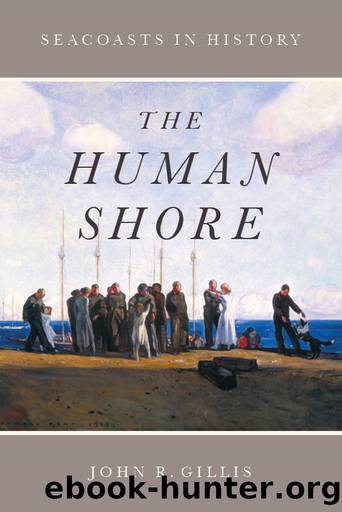The Human Shore by John R. Gillis

Author:John R. Gillis [Gillis, John R.]
Language: eng
Format: epub
Tags: History, General, Europe, United States, Nature
ISBN: 9780226324296
Google: TvglEAAAQBAJ
Publisher: University of Chicago Press
Published: 2015-11-17T16:04:37+00:00
5
THE SECOND DISCOVERY OF THE SEA
The sea is one of the most âuniversalâ symbols in literature; it is certainly the most protean.
JONATHAN RABAN1
The oceans have been discovered twice over. In the first Age of Discovery, seas were explored and charted as a means to reach distant lands, but little attention was paid to the waters themselves. It has been said that âthe deep sea made hardly an impression. . . . Even ocean-going explorers were more land than ocean oriented; they used the sea merely as a highway to get to the next landfall.â This was a discovery more by sea than of the sea. Early modern science knew much more about the heavens than about the oceans, and more attention was paid to extracting the wealth of the seas, namely fish, than to the waters themselves. All that lay beneath the surfaceâthe Deepâwas thought to be an unfathomable abyss, impenetrable and unknowable, a dark dead zone that trapped all that sank below the surface, never revealing its secrets. Until the nineteenth century, notes James Hamilton-Paterson, our understanding of the sea was âliterally superficial, . . . a navigable surface, obviously, above the abyss.â2
The second discovery of the sea, beginning in the nineteenth century, produced a vast expansion of knowledge of the sea itself, now as a three-dimensional living thing with a history and geography all its own. Modern times accomplished what no other era had even attempted: the discovery of the deep sea. At the same time it brought about another discovery, this one as much literary and artistic as scientific, a metaphorical rather than physical reconnaissance that has had equal, if not greater, consequences for popular culture in the modern era.
Since ancient times, the oceans had been considered utterly alien to humankind. One went to sea out of necessity rather than desire. The voyage was a ânecessary evil, a crossing of that which separates and estranges,â writes W. H. Auden. It was fate, not choice, that took Odysseus offshore. During the entire voyage it was nostos, homecoming, not the sea, that was at the forefront of his consciousness. For medieval Christians, the sea was comparable to the desert that had inspired the first generation of churchmen. St. Brendan launched his boat upon its vast emptiness in the hope of finding God there. His voyage was that of a peregrinato, an ordeal meant as a test of faith under the most adverse conditions.3
Erasmus warned that it was âfolly to trust in the sea,â and John Donne wrote in 1619 that âthe sea is no place of habitation, but a passage to our habitations.â That was the way William Bradford understood the Mayflowerâs ordeal. For him the voyage was a âsea of troubles,â but it is significant that he reserves the description âhideous and desolate wildernessâ for the land that was the Pilgrimsâ destination. For these Christians, the voyage was an encounter not with nature but with the supernatural. The voyage to America was itself an act of faith in
Download
This site does not store any files on its server. We only index and link to content provided by other sites. Please contact the content providers to delete copyright contents if any and email us, we'll remove relevant links or contents immediately.
Eating Animals by Foer Jonathan Safran(709)
J. M. Coetzee and Ethics by Anton Leist(679)
Cats by Unknown(634)
Tears of Battle by Brigitte Bardot(565)
Rescue Ink by Rescue Ink(553)
Food and Nutrition by Unknown(452)
Pigs of Paradise by T. R. Todd(428)
Run, Spot, Run: The Ethics of Keeping Pets by Jessica Pierce(422)
Kindness for All Creatures by Sarah C. Beasley & Anam Thubten(419)
Simple Recipes for Joy by Sharon Gannon(393)
Wild Horse Annie and the Last of the Mustangs by David Cruise & Alison Griffiths(378)
Veganism, Sex and Politics: Tales of Danger and Pleasure by C. Lou Hamilton(349)
Animals and Women: Feminist Theoretical Explorations by Carol J. Adams & Josephine Donovan(336)
How to Count Animals, more or less by Shelly Kagan(321)
Prison Dog Programs by Mary Renck Jalongo(318)
Making a Killing by Bob Torres(269)
Our Symphony with Animals by Aysha Akhtar(266)
The Joyful Vegan by Colleen Patrick-Goudreau(258)
The Routledge Handbook of Animal Ethics by Bob Fischer;(257)
